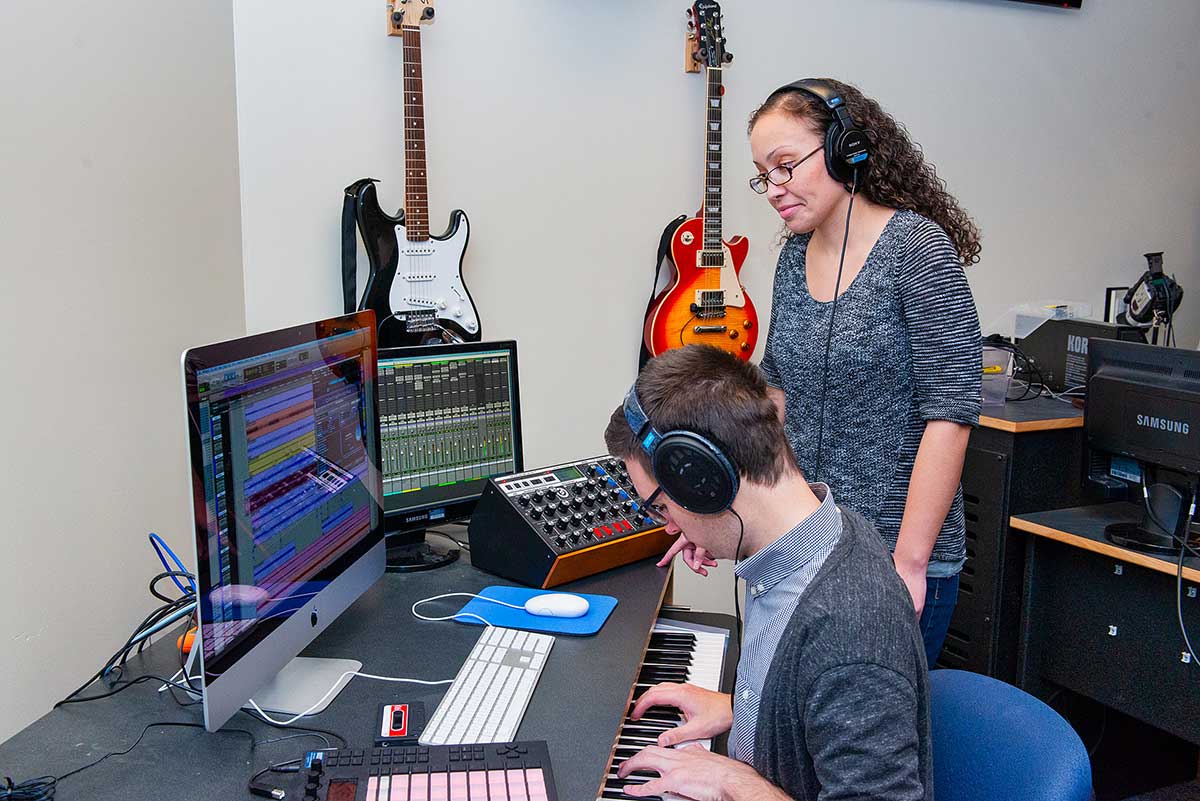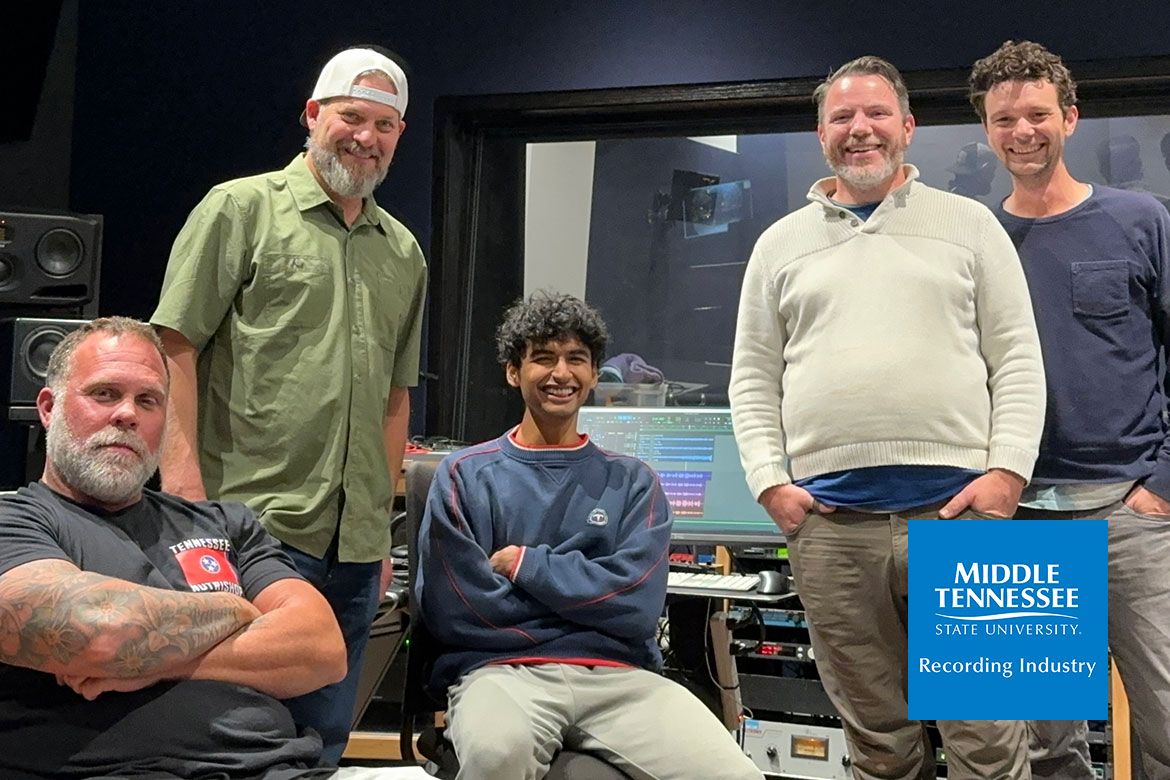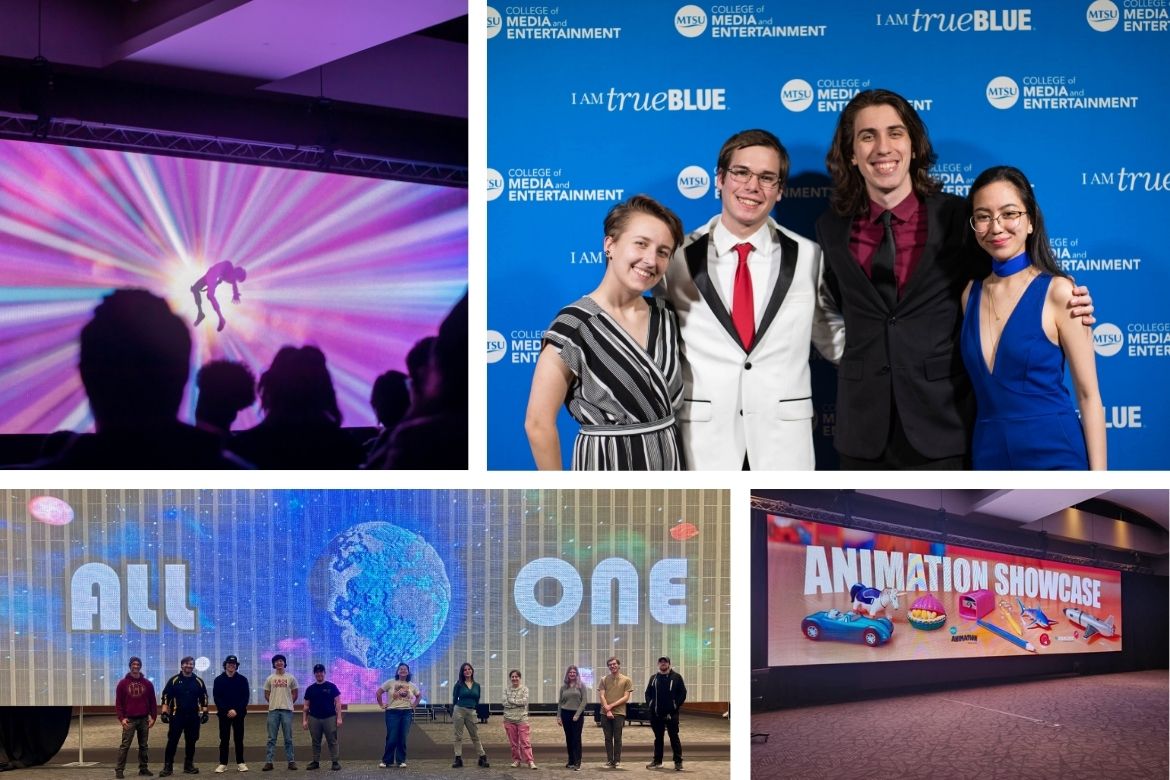
Audio Production
Learn to create and thrive in diverse audio areas. Unique electives, expert faculty, and hands-on experience.
Audio Production, B.S.
The Audio Production degree program is one of the most established programs of its kind in the country - in one of the most established departments in the country - and offers students with and without musical backgrounds an environment to learn, develop, create, and thrive across multiple areas of audio.
Its unique placement allows students to acquire extensive insight and depth through electives covering topics such as music recording and mixing, mastering, electronic music production, sound reinforcement (live sound), sound for a picture (TV, film, etc.), sound design, immersive audio, and broadcast audio. Internationally recognized, award-winning faculty teach in highly equipped studios and labs. We encourage students to take advantage of our internship opportunities.
For information about course requirements and progression, please see the REQUIREMENTS section below. For very detailed information about program admission requirements, music/portfolio requirements, transfer students, scholarships, department tours, and technology requirements, please see the INFORMATION section below.
For technical requirements for the Audio Production program please consult here.
Frequently Asked Questions
What is an audio production degree?
An Audio Production degree—which may also be called Audio Engineering, Music Engineering, Sound Engineering, Music Technology, or Sound Technology—blends together the theory and science of sound and audio with hands-on application.
What can I do with an audio production degree?
While sound touches nearly all aspects of our lives, audio production programs typically focus on the entertainment, development, or commerce sides of audio as opposed to the medical side. Capturing, creating, and mixing music; designing systems and handling sound for live performances such as concerts and theater; capturing, creating, and mixing sound for film, television, streaming, and video games; capturing, mixing, and delivering sound for broadcasts of live events such as for sporting events and awards ceremonies; providing design, installation, and support of permanent sound systems in venues such houses of worship and conference centers; providing sales and support of audio hardware and software to individual and business consumers; and maintaining and repairing audio equipment and software are some responsibilities of audio professionals.
Do audio engineers need a degree?
Unlike some professions where a bachelor's or higher level degree are required (such as many positions in the medical field), a degree is not required for some positions in the field of audio. However, many employers value the rigor and exposure that degree-seeking students have experienced.
What are the key benefits of earning a degree in audio production or engineering?
Key benefits of earning a degree in audio production include exposure to and practice within many aspects of audio (e.g., music production, sound reinforcement/live sound, broadcast, sound for picture, etc.), a deeper understanding of how theory and application work together, the ability to segue into various areas of audio due to the deeper understanding and exposure presented in school, opportunities to engage with professionals and others in the field via program connections, to name a few.
How do I select the best audio production program for my career goals?
Selecting a program that provides a solid foundation in the major (often referred to as “core” courses) and many frequently offered elective options will provide the greatest level of exposure to the field. Some programs are part of a university’s Music department and coupled with a degree in Music, which may limit elective options. Middle Tennessee State University’s Audio Production program, for example, is separate from the School of Music and offers dozens of electives across most areas of audio production, with two or more classes offered in those areas to allow for deeper development, exposure, and growth.
If you live in one of these states: AL AR DE GA KY LA MD MS OK SC VA; you may be able to attend MTSU at in-state rates under the Academic Common Market program.
News Briefs

MTSU football game, alums make perfect mix for Recording Industry student’s first studio record with local band
Mahi Parsai was working as a sound engineer and running audio during MTSU's homecoming game against Duke University last year when he first heard Stones River Revival perform.[ Read More ]

MTSU’s media college hits milestone with premiere of animated film ‘All One’
MT Imagine Animation Studios, stylized as MT IMAGINE, serves clients by creating animated content for MTSU and organizations outside the university. [ Read More ]
News Briefs

MTSU football game, alums make perfect mix for Recording Industry student’s first studio record with local band
Mahi Parsai was working as a sound engineer and running audio during MTSU's homecoming game against Duke University last year when he first heard Stones River Revival perform.[ Read More ]

MTSU’s media college hits milestone with premiere of animated film ‘All One’
MT Imagine Animation Studios, stylized as MT IMAGINE, serves clients by creating animated content for MTSU and organizations outside the university. [ Read More ]
Related Media

Audio Production, B.S.
Created with input from music industry professionals and the leading industry associations, MTSU’s innovative Recording Industry curriculum is a cutting-edge program that helps blaze a tailor-made path for its students into any of the many rewarding careers of Tennessee’s robust music industries. Examples include:
- Acoustician
- Audio Editor
- Audio Stage Technician
- Forensics Media Consultant
- Live Sound
- Engineer
- Mastering Engineer
- Mix Engineer
- Producer
- Recording Engineer
- Studio Designer
- Studio Manager
Employers of MTSU Audio Production alumni include
- A.G.E. Post
- Automated Processes, Inc
- CMT
- Cognitech
- DFA Solutions
- Eight Day Sound
- Elite Multimedia
- Gaither Studios
- Masterdisk
- Mobile Recording LA
- Nashville Symphony
- RFD-TV
- Stillbrook Studios
- Tennessee Theater
- The Audio Distillery

MTSU’s Career Development Center
MTSU offers a comprehensive Career Development Center that serves students throughout the full student experience and beyond. They collaborate with faculty and staff to equip students with the tools to be marketable to the world of work and continuing education.
Students can schedule an appointment or check online resources and job boards at mtsu.edu/career.
Students can find current internship opportunities by talking to faculty and visiting the University job and internship board called Handshake.
Wondering what you can do with your major? Check out our What Can I Do with A Major In guides.



CANDIDACY REQUIREMENTS
In general, “candidacy” (our term for being admitted into the Audio Production program) is based on overall academic performance and, more specifically, performance in three audio-related courses: RIM 3010 “Audio Fundamentals,” RIM 3300 “Digital Audio Technology,” and RIM 3600 “Survey of the Recording Industry.” Briefly, we average the GPA of those three courses with a student’s overall inclusive GPA (meaning ALL college classes completed regardless of institution) and rate from there. Those with a 3.5 or higher combined average are guaranteed admission with additional admissions filling out the approximately 60 spots awarded each fall and each spring into our program (typically out of 85-105 applicants). Academically, students who are A/B students have a very strong chance of gaining admission, while students near or below a 3.2 may find admission more challenging and competitive.
You must first be accepted to MTSU. Once accepted and selecting “Audio Production” as your major, an advisor from our college will help you navigate the required pre-candidacy coursework. In addition to the three classes mentioned above, you must also complete a Natural Science, College Algebra (or higher-level math), and RIM 1230 “Commercial Musicianship” in order to apply for candidacy (see substitution info in the “MUSIC REQUIREMENT” section below). During your final semester of completing the required coursework (typically, your second semester here at MTSU), you can apply for candidacy.
Detailed program info with specific course descriptions is available in the Academic Catalog.
MUSIC REQUIREMENT
While there are other Audio Production-focused bachelor’s degree programs that require a large amount of music coursework (music theory, music history, ensembles, etc.), we do not as we are not part of the School of Music. By not requiring this, our students can take an increased number of electives relative to audio production. As a result, we do not require a musical instrument audition. We do, however, require one music theory-focused class: RIM 1230 “Commercial Musicianship.” This class provides a foundation for understanding music tempo, melody, harmony, etc. If you don’t have a musical background, this class is meant to get you “up to speed” relative to the music understanding that we feel will be beneficial. This course requirement can be waived by scoring a 4 or greater on the AP Music Theory exam, by having taken “Music Theory I” from an accredited institution, or by having a strong music background and testing out of the class (e.g., you’ve performed in high school band or chorus for years and are comfortable with music theory). If you are interested in minoring in Music, curious about ensembles, private instrument lessons, etc., please reach out to the School of Music.
PORTFOLIO OR PREPARATION?
We do not require an audio production portfolio, as candidacy is based on academic performance. That said, we find that students who engage in some sort of audio production before taking their pre-candidacy courses generally perform better in our audio-based courses. Some examples of engagement include running sound reinforcement for their church or school theater, participating in the school TV station, recording their band – basically, anything that allows exposure to audio signal flow is beneficial. Of note, the audio workstation we use is Avid’s Pro Tools, however, exposure to any audio workstation (Logic, Audacity, GarageBand, FL Studio, etc.) is beneficial.
ELECTIVE COURSES
Our large audio production faculty allows for students to explore and “dive deep” into a number of areas via electives. Electives are courses that students get to choose from. A list of audio production elective courses can be found by scrolling to the “Audio Production Electives (18 hours)” area of the degree’s catalog page.
TUITION, ACADEMIC COMMON MARKET, AND RESIDENCY
Tuition information for in-state and out-of-state students is located here. If you are an out-of-state student, be sure to read about the Academic Common Market program. This may allow you to pay in-state tuition based on offerings of universities in your home state.
Additionally, there is the “Regional Scholars” program, which can offer as much as 48% off the standard out-of-state tuition.
MTSU also offers a program to establish residency over the course of two semesters referred to as “Part-Time/Full-Time.” For students who are out-of-state and ineligible for the ACM, this may be an appealing option.
SCHOLARSHIPS
Through the generous donations of multiple individuals and corporations, the Department of Recording Industry offers over two dozen scholarships ranging in award values from $250 to $3,000. These scholarships, awarded once per year, are limited and available, mostly, to our post-candidacy students and are often merit-based. For “traditional” scholarship opportunities (such as those awarded annually), explore the university’s scholarship page.
TRANSFER STUDENTS
Transfer students can find information relative to pathways and course equivalencies here.
In general, we do not have transferable classes for RIM 3010, RIM 3300, or RIM 3600. If you are Pro Tools Certified (Level 110 or higher), you will not be required to take RIM 3300. If you have taken an audio theory class or two at another four-year institution, you may be eligible to take an equivalency exam for RIM 3010. We have found that junior and community college audio theory classes, while helpful, do not cover all the material from RIM 3010. The courses need to be higher-level courses and not solely “in the recording studio” classes that are often offered at most community colleges. Speak with your assigned academic advisor if you feel your prior coursework has met this metric.
It is strongly suggested that transfer students do not complete all of their general education and minor coursework outside of MTSU. Having only major-related classes to complete can be very challenging given the outside-of-class time requirements for studio and lab coursework, especially when taking more than three of those type of classes in a semester. Transferring in and expecting to finish in four total semesters is not realistic and doesn’t allow the student to fully explore the classes they’re most likely interested in taking (and the reason they’re transferring here). Expect a minimum of five semesters in order to allow time to complete projects, develop, and take courses outside of the required sub-core. Additionally, many courses have prerequisites and class size limits, which may require waiting an additional semester based on program progression status.
INTERNATIONAL STUDENTS
As with U.S. citizens, international students first need to be accepted to MTSU before declaring Audio Production as a major. Information on international admissions can be found via our Office of International Affairs.
ACADEMIC ADVISING
After applying to MTSU, you will be assigned an Academic Advisor from the Scott Borchetta College of Media and Entertainment who will help you choose classes to best set you on your path towards applying for candidacy. Here’s a link to the advising site.
TOURS
Faculty-led facility tours and discussion are offered every Friday at 1:00 p.m. during fall and spring semesters. It is suggested that visitors register for the 10:00 a.m. campus tour so they can be available for the 1:00 department tour. Tours can be accommodated outside of this slot, but they might not be faculty-led. Click here to schedule a campus tour.
To schedule a department and facilities tour, please contact Kelly Grago in our office: [email protected] or call the department office at (615) 898-5740.
If you have specific questions about the Audio Production program (not transfer credit, scholarships, etc.), email Professor Matt Foglia at [email protected]
TECHNOLOGY REQUIREMENTS
COMPUTER AND SOFTWARE
Students in our program are required to have a computer and Avid Pro Tools software. Our college uses Apple Macintosh computers, with students being encouraged to do the same. An Apple MacBook Pro laptop is strongly encouraged.
Given that Avid’s Pro Tools audio software is the digital audio workstation (DAW) standard for audio production professionals, laptops and computers must meet Avid’s specifications. We use the most recent Pro Tools version based on the year of the Fall semester (e.g., Pro Tools 2024 for academic year 2024-2025). While versions are generally compatible, students are encouraged to use the same version as our facilities since features may vary from year-to-year and compatibility issues may arise when transferring work between different versions.
While we strongly encourage a MacBook Pro laptop, it is possible that students can use other computers (such as MacBook Air) as long as they meet “Pro Tools compatibility” standards. While knowledgeable, we are generally unable to support or assist with installation or compatibility issues. Specifications and a list of compatible computers can be found via this link to Avid’s site.
*Sub-links to lists of supported Mac and Windows models are available through the link.
Computers do NOT need to meet the enhanced specifications for “Pro Tools HD” or “Pro Tools Ultimate” (e.g., don’t worry about the “PCIe slot” requirement). “Pro Tools Studio” is the compatibility version students will be using on their personal computers. Note that computers do not need to be the most recent model as the software is often still compatible and fully operational with older models.
Computer internal SSD hard drive storage size should be a minimum of 256 GB. 512 GB is encouraged, but if cost-prohibitive, students can easily purchase an external SSD hard drive for a fraction of the upgrade cost (ex. 1 TB of external storage for $100). This will also provide increased flexibility when moving from facility to facility.
*Avid Pro Tools Studio software is available for a $100 per year subscription using educational pricing through Avid or Avid resellers (this may also be referred to as “Academic” or “Student” pricing). This subscription includes access to software version updates while active. Students can also purchase an iLok (software licensing USB dongle) or have software validated through continuous internet connection (free). The earliest course students will use Pro Tools is RIM 3300 “Digital Audio Technology,” though they could use it to assist with topics in the lecture-based RIM 3010 “Audio Fundamentals.” Having access to the software outside of class and labs is akin to a student having access at home to a guitar if they were taking guitar lessons; it provides greater flexibility to improve one’s skills.
ADDITIONAL HARDWARE
External SSD hard drives should be Macintosh-formatted or Macintosh-compatible if using a PC (through programs such as MacDrive).
External audio interfaces (such as those by Apogee, Focusrite, Universal Audio, etc.) are not required, however, students may desire to have input and output options different than those standard on a computer.
HEADPHONES
For many students, a set of “pro-level,” durable, high quality headphones is one of their first significant investments toward a personal studio/signal chain (outside of a computer). It makes sense to acquire quality monitoring tools early so that you can reliably and consistently evaluate sound, including your own projects and commercial reference recordings, as your skills and tools increase. It’s difficult to assess the differences between various other components that are upstream in your signal chain without good monitoring at the downstream end! One model of headphones that we’ve traditionally favored/recommended is the Sennheiser HD 650, an “open-back” style design that offers very low distortion, good frequency response and dynamics but very little sound isolation. Similarly, the Sennheiser HD 600 is an excellent open-style headphone with a very neutral, transparent character and comfortable circumaural fit, as is the Sennheiser HD 660. Audio Technica ATH-M70x is also a popular open-style headphone. For the post-candidacy class RIM 4440 “Critical Listening,” it is preferred that you have one of the open-back suggestions.
If you are purchasing your first set of high-quality headphones, you should consider how and where you intend to use them – not just in class but also outside of class. Open-back headphones may be excellent for studio and controlled environment monitoring but are a poor choice for live sound or location sound, for instance, since those around you can hear sound leakage. While potentially subject to more tonal variation and distortions as a function of both fit and design, a “closed-back” or “semi-open” design may be preferred for overdubbing and listening in noisier environments. Good examples in this category include the Beyerdynamic DT 770 PRO (32 Ohm version preferred), AKG K240-MkII, Shure SRH840, and Ultrasone Proline 750. While potentially fine when listening passively, it is not advised to use earbuds, noise-cancelling headphones, or bass-enhanced headphones (such as those from Sony and Apple’s Beats) as reference monitors when performing critical audio analysis as the tonal colorations of these can greatly skew your ability to accurately hear the audio being presented.

CONTACT US

















